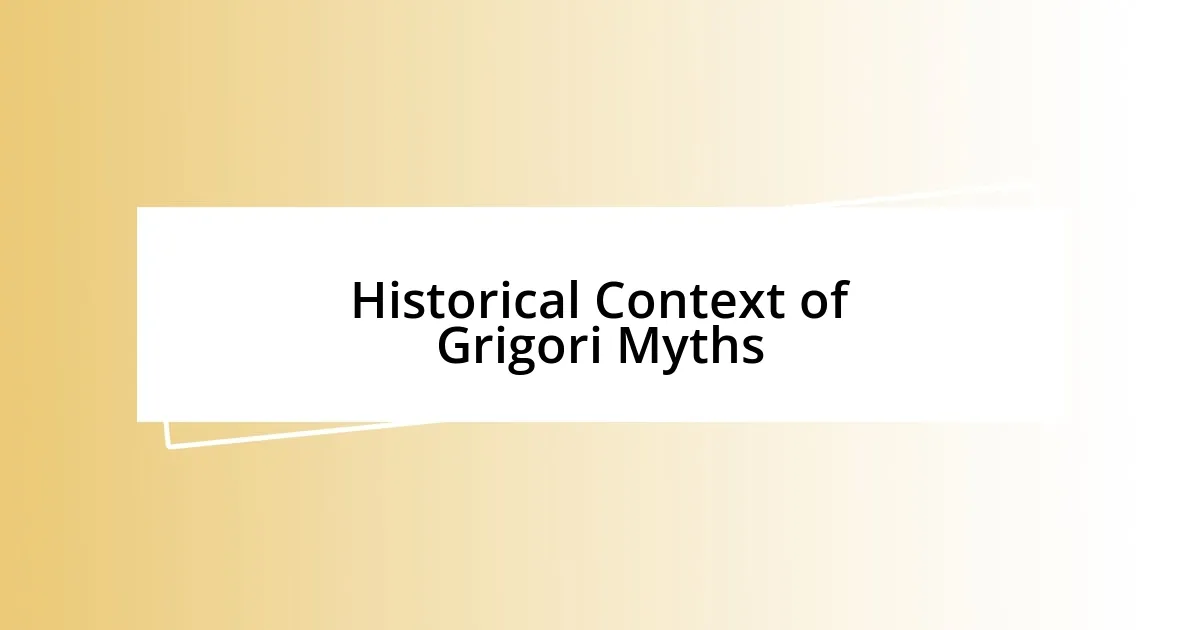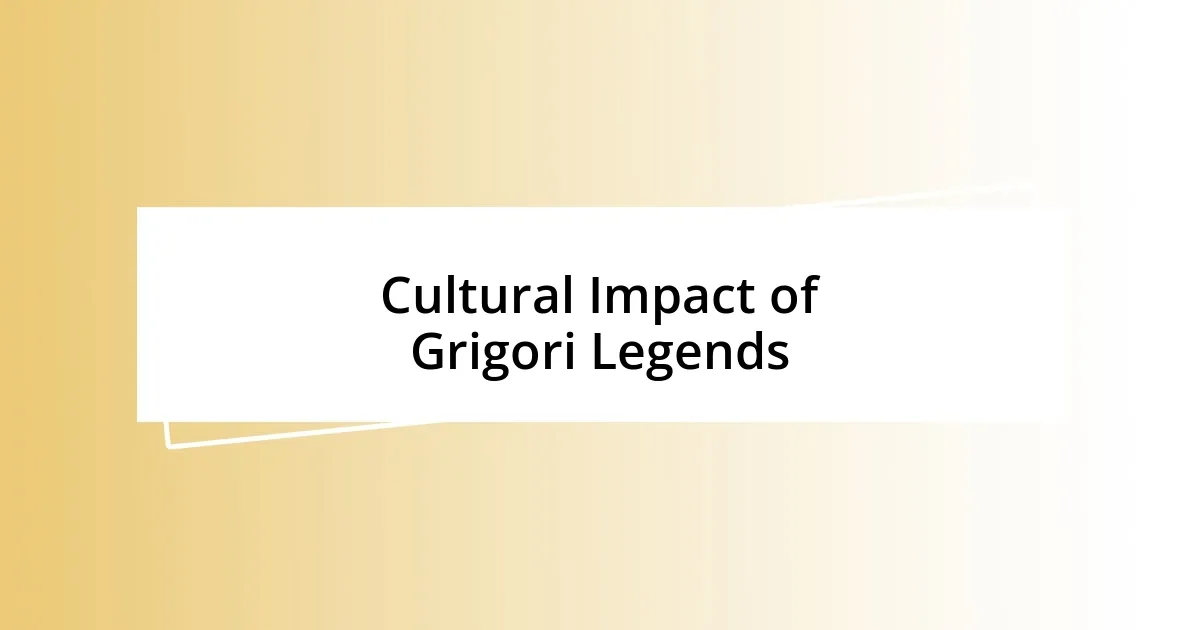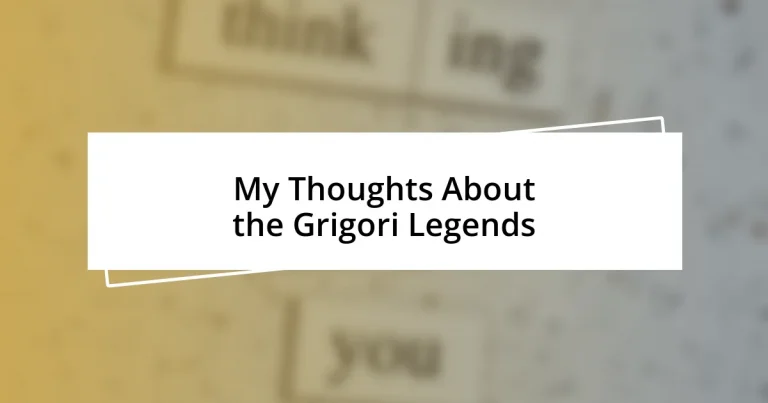Key takeaways:
- The Grigori, or Watchers, are angels from ancient legends who descended to Earth, drawn to human women, leading to significant moral dilemmas and tragic consequences.
- These myths, particularly highlighted in the Book of Enoch, reflect cultural struggles with transgression, the unknown, and consequences of defying divine law.
- Grigori legends have influenced modern media, showcasing themes of rebellion, identity, and moral conflict, making them relatable to contemporary audiences.
- The stories serve as cautionary tales about the consequences of choices, emphasizing the complexity of human emotions and the search for redemption amidst flaws.

Introduction to the Grigori Legends
The Grigori legends are one of those fascinating tales that blur the lines between the divine and the earthly. When I first stumbled upon these stories, I was captivated by the idea of angels defying celestial orders and interacting directly with humanity. It raises a question, doesn’t it? What drives celestial beings to step down from their realms?
In essence, the Grigori, often referred to as the Watchers, are angels who, according to legend, descended to Earth and became enamored with human women. I remember feeling a chill as I read about how their actions not only led to the birth of giants but also to a series of tragic consequences. It’s incredible how these narratives intertwine thrill with moral dilemmas, making me wonder if the allure of forbidden knowledge is worth the price of one’s celestial purity.
These tales, while rooted in ancient texts, resonate deeply within our modern psyche. They challenge us to reflect on our own choices and the consequences they bring. Have you ever felt that pull between duty and desire? The Grigori legends exemplify this struggle, reminding us that even the mightiest are not immune to temptation, and it’s that complexity that keeps these stories alive in our hearts and minds.

Historical Context of Grigori Myths
The Grigori myths find their roots in various ancient texts, particularly the Book of Enoch, which emerged from the rich tapestry of Jewish apocryphal literature. This text seems to channel a unique blend of divine rebellion and human intrigue, revealing societal fears about transgression and the unknown. I can’t help but think about how our ancestors grappled with these concepts as they attempted to make sense of a world filled with mystery and moral ambiguity.
Historically, the legends of the Grigori reflect the cultural and spiritual struggles of their time. They emerged during a period when the boundaries between heaven and earth often felt permeable. For instance, many ancient societies sought to explain calamities and unjust events, leading to a fascination with divine intervention—or the lack thereof. I remember discussing these themes over coffee with a friend, both of us marveling at how the stories portrayed not just punishment but also an unexpected kinship with the divine.
Furthermore, the narratives surrounding the Grigori served as cautionary tales. They addressed the consequences of defying cosmic law, using the actions of the Watchers to instill moral lessons within the community. It made me consider how we still look for meaning in our experiences today, often turning to stories, both ancient and modern, to navigate life’s complexities. These legends resonate because they encapsulate the age-old dance between aspiration and regret, which, I believe, will always be a core aspect of the human experience.
| Key Texts | Key Themes |
|---|---|
| Book of Enoch | Divine rebellion and moral consequences |
| Jewish Apocryphal Literature | Permeability between heaven and earth |

Characteristics of the Grigori Entities
The Grigori entities are often described with a blend of majesty and tragedy. Enigmatic in nature, these beings embody a profound curiosity and an insatiable desire to connect with humanity. To me, there’s something haunting about their allure; it’s fascinating how they seem to walk the thin line between divine purpose and moral folly.
- Tall and strikingly beautiful, often depicted in ancient texts as having an otherworldly presence.
- Possess profound knowledge and wisdom, but their choices lead to significant repercussions.
- Exhibit strong emotions, particularly love and desire, which ultimately contribute to their downfall.
- Known for their defiance; they willingly abandon their heavenly status, illustrating a deep yearning for experience and connection.
Each mention of the Grigori stirs a sense of empathy within me. I recall a moment when I felt drawn to pursue something forbidden. That sense of adventure and dread intertwined, a feeling I imagine the Watchers experienced as they descended to Earth. Their characteristics remind us that even angels, with all their celestial power, are susceptible to the complex tapestry of emotions and choices that weave our own lives together.

Cultural Impact of Grigori Legends
The Grigori legends have significantly shaped cultural narratives across different societies. I recall visiting a local museum and spotting an ancient artifact that depicted these enigmatic figures. It struck me how artists in centuries past sought to capture the tension between the divine and the human, fostering a sense of wonder and intrigue that persists today. This merging of art and mythology illustrates how deeply ingrained the Grigori legends are in human creativity.
In modern literature and cinema, the Grigori stories resonate as archetypal narratives of rebellion and consequence. There’s something captivating about how contemporary writers reinterpret these themes, often reflecting the struggles of identity and moral dilemmas we face. For example, I recently read a fantasy novel that drew heavily on the Grigori’s tale, and it sparked my curiosity: Why do we still find such narratives appealing? I think it’s because they mirror our own conflicts and desires, allowing us to explore the complexities of human experience through a mythological lens.
Moreover, the Grigori have left their mark on popular culture, influencing everything from music to fashion. I remember attending a concert where the band wove references to these ancient figures into their lyrics, creating a haunting yet beautiful atmosphere. It made me think about how these legends serve not just as cautionary tales but as symbols of yearning and the search for connection—ideas that resonate deeply with all of us today. What is it about these stories that keeps us coming back? Perhaps it’s their ability to evoke deep emotions, reminding us of our own aspirations and the shadowy paths we navigate in life.

Grigori Legends in Modern Media
In modern media, the Grigori legends pop up in intriguing ways, often reimagined through a contemporary lens. I remember first encountering these stories in a TV series that leaned heavily on the theme of fallen angels. There was a particular episode that left me pondering: What drives beings of immense power to forfeit their place among the divine? It was mesmerizing to see how the essence of the Grigori prompted characters to confront their own humanity, showcasing that the struggle with morality isn’t just an ancient story but a narrative still alive and relevant today.
Books and graphic novels have also embraced the allure of the Grigori, exploring themes of love, betrayal, and redemption. One graphic novel I stumbled upon emphasized the emotional turmoil of a Grigori-like figure torn between duty and desire. How compelling is that? The visual artistry combined with complex storytelling made me reflect on how these characters are often painted in shades of gray, challenging our traditional views of good versus evil. It reminded me that even in their treachery, there’s a profound, relatable struggle.
Furthermore, the impact of the Grigori extends into social media, where creators share reinterpretations and fan art inspired by their tales. I once saw a breathtaking piece on Instagram that depicted a Grigori in a modern urban setting, capturing both their ethereal beauty and tragic sense of loss. Why is that image so striking? It’s this juxtaposition of the ancient and the contemporary that resonates with us. It reveals how these timeless legends continue to reflect our own desires for connection and understanding in an increasingly complex world.

Personal Reflections on Grigori Tales
Reflecting on the Grigori tales, I often find myself drawn to the themes of isolation and longing that these legends evoke. There was a moment in my life when I felt caught between expectations and my genuine self, just like the Grigori who defy divine orders. It makes me wonder: Can we really blame them for their rebellion? I believe their stories resonate because they remind us of our own struggles with identity and the need for acceptance.
One particular Grigori legend that stands out to me involves a character who chooses to experience human emotions—love, pain, and ultimately loss. I remember reading this story late one night, and it struck a chord deep within me. Have you ever felt that pang of grief for something you can never quite grasp? The Grigori’s choices illustrate how powerful and complex human emotions can be, casting a light on our own desires to connect with others, even when it leads to heartache.
During a recent discussion with friends about mythology, I shared my fascination with the Grigori, noting how their tales transcend time and culture. One friend mentioned their haunting beauty, which got me thinking: Why do we find them so alluring? For me, it’s the tragic elegance of their existence that captivates imagination, evoking a sense of empathy and understanding. In these narratives, I see reflections of our own eternal quests for purpose and belonging.

Lessons Learned from Grigori Stories
The Grigori stories teach a valuable lesson about consequences and the price of choices. I recall a time in my life when a decision felt monumental, much like those faced by the Grigori. Their stories remind me that every action has repercussions, and while we might yearn for freedom, sometimes it comes at a steep cost. Isn’t it fascinating how these ancient tales echo our everyday dilemmas?
I’ve often felt a pull between ambition and morality, similar to the Grigori’s internal conflicts. One evening, while sifting through old journals, I stumbled upon my reflections on past mistakes. It hit me that the Grigori’s struggles with their identities resonate deeply with our own experiences of self-discovery. Can we truly escape our innate nature, or is that struggle part of what makes us human? These questions linger long after the tales end.
Moreover, reflecting on the theme of redemption in Grigori legends has been eye-opening for me. I vividly remember a heart-to-heart conversation with a close friend about seeking forgiveness after a recent fallout. The way Grigori are sometimes portrayed as striving for redemption amidst their darker choices serves as a powerful reminder that change is possible, even for those who have strayed far from their paths. Isn’t it comforting to think that there’s always a chance to seek light, no matter how far one has fallen?














